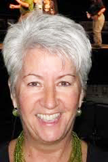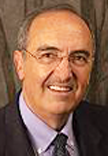Those Affected Say Shea’s Proposals Would Further Undermine Candidates’ Campaigns

Former City Council member and current mayoral candidate Brigid Shea says she wants more limits on—and more disclosure of—contributions made to City Council incumbents and challengers.
At a press conference at City Hall this morning she announced proposals that are far tougher than reforms the Charter Revision Committee has recommended for the City Council to put on the November ballot, including restrictions on bundled campaign contributions.
Bundlers are individuals who solicit and obtain contributions of $200 or more from five or more individuals. The reporting of bundlers’ names in contribution reports is already required by City Code Section 2-2-22.
A chart that served as a backdrop for the press conference was titled “Bundling Influence at City Hall.” The chart displayed the names of 13 individuals who bundleda total of $103,900 incontributions detailed in the incumbents’ January 2012 campaign finance reports. Not all of the bundlers listed are currently registered city lobbyists.
Attorney David Armbrust of Armbrust and Brown PLLC topped the list with $43,050 in contributions distributed to the four incumbents running for re-election: Mayor Lee Leffingwell, Mayor Pro Tem Sheryl Cole, and Council Members Mike Martinez and Bill Spelman.
Shea said that most of the money bundled by Armbrust came from members of his law firm and their spouses.
“That (law) firm also happened to represent Formula One and the Marriott Hotel, which each got substantial fee waivers from the city,” Shea said.

Armbrust, in a follow-up interview with The Austin Bulldog, said, “I’m a very strong believer in open government. I have no problem with disclosure and making information easy for the public to discover and find.”
“We have a problem in Austin,” Armbrust added, “not enough people vote. Campaign contributions limit people’s ability to take their message to the media and makes it hard for the public to understand who the candidates are and what the issues are.
“That has a stifling effect on voter turnout,” Armbrust said. “It also tends to favor incumbents and people of high wealth who can afford to loan money to their campaigns. When you talk about campaign contribution limits, at the end of the day it has an impact on voter turnout.”
Shea bundles, too
In response to a reporter’s question about whether Shea uses bundlers to help raise money for her mayoral campaign, she replied, “I am not using any bundlers who are seeking contracts from the city. People who have house parties who collect above $5,000 are required to be listed as bundlers. None of them—as far as I know—is either seeking professional services contracts from the city or is a registered lobbyist.”
The mayoral candidate noted this isn’t the first time she advocated for restrictions on lobbyists.
“As a council member in the 1990s, I was instrumental in passing the ordinance that placed the $25 limit on contributions from lobbyists,” Shea told reporters. (An ordinance to limit lobbyists’ contribution was enacted in 1994. Shea served on the council from June 1993 to June 1996. Minutes of the council meeting in which the restriction was passed could not be immediately located.)
“Limiting the amount of money that lobbyists can directly contribute was a huge step forward for Austin, but it is time to close the loophole that lets lobbyists and contractors bundle thousands upon thousands of dollars from their clients and colleagues,” she said.
Shea proposes to limit lobbyists and their firms to a total of $1,750 in bundled contributions.
She also wants the same limits applied to firms that have professional services contracts with the city of more than $100,000. This restriction would apply to contracts for architectural, engineering, legal, public relations, surveying and other professional services that are not awarded on the basis of low bids but upon the proposals made by the competing firms.
The City Council has the discretion to bypass staff recommendations for professional services and award contracts to companies who were not the highest rated in staff evaluations.
Even more radical is Shea’s proposal to increase transparency by requiring individuals and businesses seeking contracts, incentives, waivers, or zoning changes to disclose all the political contributions they made to council members over the past three years—plus any contributions to political action committees or third-party organizations aimed at influencing city elections.
“It taints the process (when) those who are financing the incumbents’ campaigns are the same ones getting millions in city contracts and deals,” Shea said.
“The intent of this is to catch companies who are giving money as a firm, so while they may not report it as bundling, many of these firms are making contributions. The intent is to identify those firms that have professional services contracts and that are giving large sums of money, and put a limit on it.”
An engineer responds

One of the bundlers listed in Shea’s chart is Paul Bury of Bury + Partners Engineering Solutions, a company based in Austin. According to Shea’s math he bundled $3,850, $1,750 of which went to Mayor Leffingwell and $2,100 to Council Member Martinez.
In an interview with The Austin Bulldog, Bury said of Shea’s call for more disclosures by firms competiting for professional services contracts, “All of this information is already there and easily accessible. Most of it is online and not hard to find.”
“Any effort to try to thwart the democratic process in the United States seems to fly in the face of what we love in America,” Bury said.
He said that Shea’s proposed restrictions for professional services companies such as his would add another layer of time and cost.
“I don’t see the need for it,” Bury said.
Shea said the exact language to implement her proposals has not been worked out and that could be accomplished through consultation with the city’s law department and other experts. But the intent is to capture more information, and try to limit the influence on campaigns of people trying to get contracts or other things of great value from the city.
“We need to end the culture at City Hall, where the doors are always open to lobbyists, and the costs of new development are passed on to the citizens of Austin,” Shea said.
Veteran political consultant comments

Peck Young, who is retired from a decades-long career as a consultant who succeeded in getting people elected to the City Council, derided Shea’s proposals. He says the current restrictions that prohibit contributions of more than $350 has created a severe limitation on a candidate’s ability to communicate with voters.
“Money is the means by which you communicate in politics,” Young said. “If you strangle money in campaigns, you strangle the ability to explain what you stand for.”
“There is one way to genuinely fix” the problem of money’s influence on council campaigns, Young said, and that’s to implement the 10-1 plan for electing council members from geographic districts.
Both the council-appointed Charter Revision Committee and Austinites for Geographic Representation (AGR) have recommended the 10-1 plan.
AGR is petitioning to get this proposition before voters in a November election, in case the city council does not vote to put it on the ballot. An intergral part of the AGR petition is the establishment of an Independent Citizens Redistricting Commission that would draw the lines for council districts that the City Council would have no choice but to adopt.
Young has been part of the AGR initiative since the group first started meeting in February 2011.
With a current city population of 800,000, having 10 council districts would provide an average of 80,000 residents per district. A far smaller number would be people of voting age who registered to vote.
Shea nevertheless will press for the reforms she proposed as a major campaign issue in trying to unseat Leffingwell.
“I guess I’m not one of those kinds of people that says, no matter what, everything is corrupt and there’s nothing you can do about it,” Shea said. “I really do believe that these kinds reforms and limits are essential to good government.”
Upate: This report has been updated to reflect the publication date of March 20, 2012 (not February 20, 2012, as incorrectly stated).
This report was made possible by contributions to The Austin Bulldog, which operates as a 501(c)(3) nonprofit to provide investigative reporting in the public interest. You can help sustain this kind of reporting by making a tax-deductible contribution.







